 W
WAstrapia is a taxonomic genus of birds-of-paradise (Paradisaeidae). The genus contains five species, all endemic to New Guinea. The males have highly iridescent plumage and remarkably long tails. Females are duller and have shorter tails.
 W
WThe astrapian sicklebill, also known as the green-breasted riflebird, is a bird in the Paradisaeidae family that is believed to be an intergeneric hybrid between an Arfak astrapia and black sicklebill. This explanation was proposed by Erwin Stresemann who used the same explanation for the Elliot's bird-of-paradise. The two forms are substantially different and the latter's validity is still under question.
 W
WBensbach's bird-of-paradise, also known as Bensbach's riflebird, is a bird in the family Paradisaeidae that is often now considered an intergeneric hybrid between a magnificent riflebird and lesser bird-of-paradise. However, some authors, such as Errol Fuller, believe that it was a distinct and possibly extinct species.
 W
WRothschild's lobe-billed bird-of-paradise, also known as the noble lobe-bill, is one of six enigmatic species of bird-of-paradise collected in Papua New Guinea for zoologist Walter Rothschild, 2nd Baron Rothschild. It is only known from the holotype.
 W
WCarola's parotia, also known as Queen Carola's six-wired bird-of-paradise or Queen Carola's parotia, is a species of bird-of-paradise.
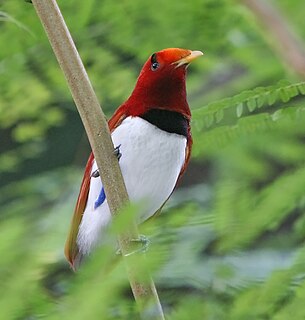 W
WThe genus Cicinnurus consists of three sickletail birds-of-paradise that are classified in two subgenera.
 W
WThe crinkle-collared manucode is a species of bird-of-paradise.
 W
WDrepanornis is a genus of bird-of-paradise found in forests of New Guinea. They have long decurved sickle-like bills and an overall brown plumage.
 W
WDuivenbode's riflebird is a bird in the family Paradisaeidae that is a presumed intergeneric hybrid between a magnificent riflebird and lesser lophorina. The common name commemorates Maarten Dirk van Renesse van Duivenbode (1804-1878), Dutch trader of naturalia on Ternate.
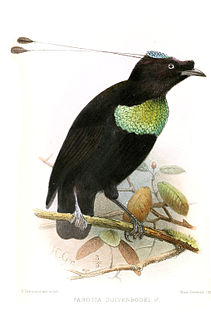 W
WThe Duivenbode's six-wired bird-of-paradise, also known as Duivenbode's six-plumed bird-of-paradise, is a bird in the family Paradisaeidae that is an intergeneric hybrid between a western parotia and greater lophorina. The common name commemorates Maarten Dirk van Renesse van Duivenbode (1804–1878), Dutch trader of naturalia on Ternate.
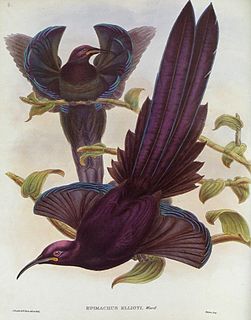 W
WElliot's bird of paradise is a bird in the family Paradisaeidae that is presumed to be an intergeneric hybrid between a black sicklebill and Arfak astrapia. This assumption was made by Erwin Stresemann who had also dismissed other new species of birds of paradise as hybrids. A minority of ornithologists dispute this claim; specimens are considerably smaller than the latter two species. Additionally, Stresemann used the A. nigra x E. fastuosus explanation for the astrapian sicklebill as well. It was first described by Edward Ward in 1873.
 W
WThe emperor bird-of-paradise, also known as emperor of Germany's bird-of-paradise, is a species of bird-of-paradise.
 W
WThe Empress of Germany's bird of paradise, Paradisaea raggiana augustavictoriae, is a large, up to 34 cm long, maroon brown bird in the family Paradisaeidae, one of three families of birds known as birds of paradise. The male has a dark emerald green throat, yellow crown, pale brown below and narrow yellow throat collar. It closely resembles the crimson-plumed Raggiana bird-of-paradise, but has apricot orange rather than crimson flank plumes. The female is an overall brown bird with yellow head and dark brown face.
 W
WEpimachus is a genus of birds-of-paradise (Paradisaeidae) that includes two species, found in the highland forests of New Guinea. They are the largest members of the family. The common name "sicklebill" refers to their long, decurved, sickle-shaped bill.
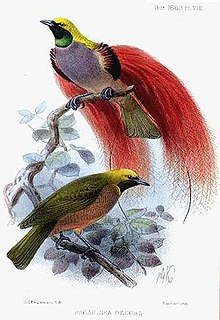 W
WThe Goldie's bird-of-paradise is a species of bird-of-paradise.
 W
WThe growling riflebird, also known as the eastern riflebird, is a medium-sized passerine bird of the family Paradisaeidae.
 W
WThe King of Holland's bird of paradise, also known as King William III's bird of paradise or the exquisite little king, is a bird in the family Paradisaeidae that is a hybrid between a magnificent bird of paradise and king bird of paradise.
 W
WLophorina is a genus of birds in the family Paradisaeidae. After genetic analysis, officials have agreed to include the riflebirds in the present genus.
 W
WThe lesser superb bird-of-paradise or lesser lophorina is a disputed species of passerine bird in the bird-of-paradise family Paradisaeidae. It is endemic to Papua New Guinea. It is generally considered a subspecies of the superb bird-of-paradise.
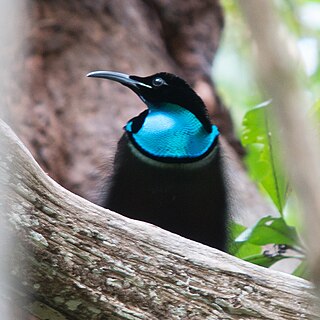 W
WThe magnificent riflebird is a species of passerine bird of the family Paradisaeidae.
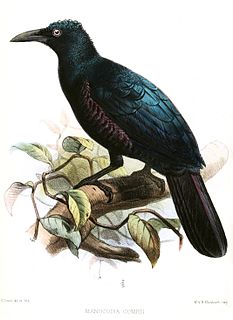 W
WManucodes are birds-of-paradise in the genus Manucodia, that are medium-sized with black-glossed purple and green plumages.
 W
WThe glossy-mantled manucode is a species of bird-of-paradise.
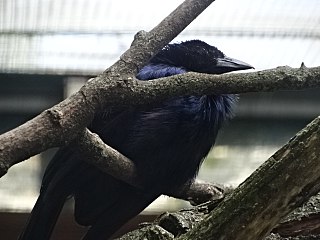 W
WThe trumpet manucode is a species of bird in the family Paradisaeidae.
 W
WThe genus Paradigalla consists of two species of birds-of-paradise. Both are medium-sized black birds with blue and yellow facial wattles.
 W
WThe long-tailed paradigalla is a large, approximately 37 cm long, black bird-of-paradise with long and pointed tail. One of the most plain members in the family Paradisaeidae, its only adornment is the colorful facial wattles of yellow, red and sky-blue near base of the bill. Both sexes are similar in appearance, however the female is slightly duller and smaller.
 W
WThe short-tailed paradigalla is a species of bird-of-paradise.
 W
WThe parotias are a genus, Parotia, of passerine birds in the bird-of-paradise family Paradisaeidae. They are endemic to New Guinea. They are also known as six-plumed birds of paradise, due to their six head quills. These birds were featured prominently in the BBC series Planet Earth.
 W
WThe brown sicklebill, also known as Bee's sicklebill, is a species of bird-of-paradise.
 W
WThe Splendid astrapia is a species of Astrapia of the birds-of-paradise family, Paradisaeidae, and one of the least known and most elusive of its family and genus.
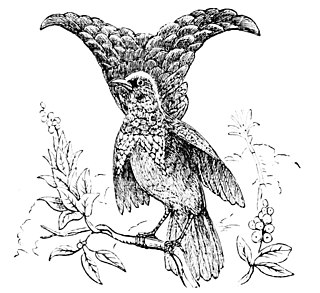 W
WThe Vogelkop superb bird-of-paradise or crescent-caped lophorina, sometimes noted as the curl-caped bird-of-paradise, is a species of the Paradisaeidae (bird-of-paradise) family. It is endemic to the Bird's Head Peninsula in New Guinea. First described in 1930 by Ernst Mayr, it had been treated as a subspecies of the superb bird-of-paradise but was elevated to the status of a full species in 2018 based on its striking black plumage that its feathers absorb 99.95 percent of light and behavioral differences especially visible in the courting male, as shown in audiovisual data documented by Scholes and Timothy Laman of Harvard University's Museum of Comparative Zoology.
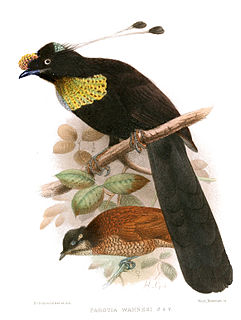 W
WWahnes's parotia is a medium-sized passerine of the bird-of-paradise family (Paradisaeidae). This species is distributed and endemic to the mountain forests of Huon Peninsula and Adelbert Mountains, northeast Papua New Guinea. The diet consists mainly of fruits and arthropods.
 W
WThe western or Arfak parotia, is a medium-sized, approximately 33 cm long, bird-of-paradise with a medium-length tail.
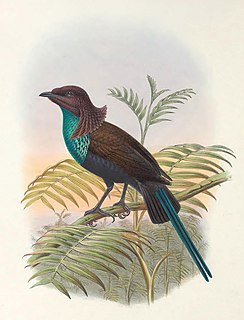 W
WWilhelmina's bird-of-paradise, also known as Wilhelmina's riflebird, is a bird in the family Paradisaeidae that is presumed to be an intergeneric hybrid between a greater lophorina and magnificent bird-of-paradise.